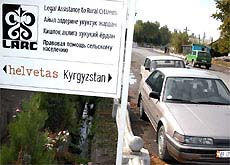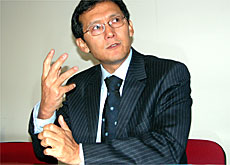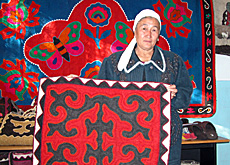Laying down the law for Kyrgyzstan’s farmers

Legal disputes over land ownership have become a central feature of the new Kyrgyzstan.
A project co-funded by Switzerland aims to educate farmers about their legal rights and how they can protect themselves against corruption and illegal appropriation of land.
“The acting mayor tried to claim half of my land,” said Tapaiev Amarvek, a farmer in Kyrgyzstan’s Fergana Valley.
“One night a group of his drunken colleagues came to my house and threatened to take over the property,” he said.
Amarvek was given 30 hectares of land on which to breed horses after the government of Kyrgyzstan embarked on a wide-scale privatisation programme in 1996.
While the policy ensured many ordinary farmers were given access to land, most remain ignorant about their legal rights.
To help educate landholders such as Amarvek, international donors established the Legal Assistance to Rural Citizens (LARC) programme three years ago.
Graft and corruption
LARC specialises in running test cases on behalf of farmers and encouraging local authorities to practise “good governance”.
The organisation operates throughout the country, and has 21 regional bureaux, each staffed by at least two lawyers.
Kachynbaev Nadyrbek, the head of LARC’s bureau in Jalal Abad, told swissinfo there were countless cases of farmers having their rights trampled on.
“Privatisation created many problems, and not all of them can be resolved under current legislation,” Nadyrbek said.
“That’s why we try to set legal precedents that must be followed by others.”
However, the biggest problems are related to local officials and bureaucrats who use the general level of ignorance for their own enrichment.
LARC devotes much of its energy to educating bureaucrats about property law and the need to pursue problem cases through the courts.
Nishanbaev Gairat, the mayor of 30,000 people in the village of Bazar-Korgon, confirmed the problem.
“Once we used to simply confiscate land if we thought it was being illegally used,” Gairat said.
“These days that is no longer possible. Now we go through the court system.”
Contract law
LARC’s activities have also helped spread the use of formal contracts. Rather than rely on verbal agreements, LARC urges farmers to put business deals in writing.
The group regularly produces form contracts that are used, for instance, by cotton farmers negotiating prices with millers.
Although most observers believe the biggest problems associated with privatisation have been resolved, the need for well-qualified lawyers is unlikely to diminish.
This year alone, LARC’s Jalal Abad office handled 439 clients. “More and more, we find ourselves dealing with family and inheritance issues,” Nadyrbek said.
Self funding
LARC hopes to guarantee its long-term survival by charging farmers fees for its legal services.
“That puts pressure on us to do a good job, because no farmer will pay for a service that is unconvincing,” Nadyrbek said.
Horse-breeder Amarvek said he was impressed by the service.
“After my lawyer took on my case, I won back my land. And some time later, the acting mayor was replaced,” he said.
swissinfo, Philippe Kropf and Jacob Greber in Jalal Abad
The Legal Assistance to Rural Citizens (LARC) programme was set up three years ago to educate landholders about their rights.
LARC specialises in running test cases on behalf of farmers and encouraging local authorities to practise “good governance”.
The organisation operates throughout the country, and has 21 regional bureaux, each staffed by at least two lawyers.
Switzerland’s State Secretariat for Economic Affairs jointly funds the project alongside the United States aid organisation, USAID.
The government of Kyrgyzstan privatised the country’s Soviet-era collective farms in 1996.

In compliance with the JTI standards
More: SWI swissinfo.ch certified by the Journalism Trust Initiative










You can find an overview of ongoing debates with our journalists here . Please join us!
If you want to start a conversation about a topic raised in this article or want to report factual errors, email us at english@swissinfo.ch.